Our stomachs, often considered the cornerstone of our well-being, can be fickle companions. While certain foods nourish and energize, others stealthily disturb our digestive harmony. The following list explores twenty foods known for their potential to disrupt your stomach’s tranquility. By understanding what might cause discomfort, you can make more informed dietary choices.
1. Carbonated Beverages

Bubbles may add excitement to your drink, but they might not be your stomach’s best friend. Carbonated beverages, loved for their fizz, can lead to bloating and discomfort. This bubbly allure often traps gas in the digestive system, causing a feeling of fullness or pressure.
Some people find this sensation delightful, while others might suffer from significant discomfort. Switching to non-carbonated drinks could present a simple remedy. Who knew such tiny bubbles could wield such power? Next time, think twice before reaching for that fizzy delight.
2. Caffeinated Drinks

For many, caffeine is the fuel that jumpstarts the day. Yet, this beloved stimulant can irritate the lining of your stomach, leading to acid production and discomfort. Those sensitive to caffeine might experience heartburn or even nausea.
Alternatives like herbal teas or decaf options offer a gentler touch without sacrificing the ritual. Moderation could be key in enjoying your morning brew without the unwelcome side effects. So, while caffeine stirs your spirits, it might also be stirring trouble in your tummy.
3. Fried Foods

The irresistible crunch of fried foods often hides a greasy secret. Fried delights are typically high in fat, making them difficult for the stomach to digest. This can result in an unsettled feeling or even heartburn. The high-fat content slows down the digestive process, leaving you feeling sluggish.
Choosing baked or grilled alternatives can offer the same taste with less turmoil. With each bite, consider the possible digestive aftermath. Savoring a crunchy bite might not be worth the stomach unrest that follows.
4. Artificial Sweeteners

In the quest to cut calories, artificial sweeteners often come into play. However, these sugar substitutes can be a hidden source of stomach woes. Some sweeteners aren’t fully absorbed, leading to gas and bloating. For those prone to digestive sensitivity, the discomfort can be pronounced.
Exploring natural sweetening options like honey or maple syrup might provide a pleasant alternative. Awareness of these sugar substitutes can lead to more comfortable eating experiences. Indulging your sweet tooth shouldn’t come with unwelcome surprises.
5. Spicy Foods
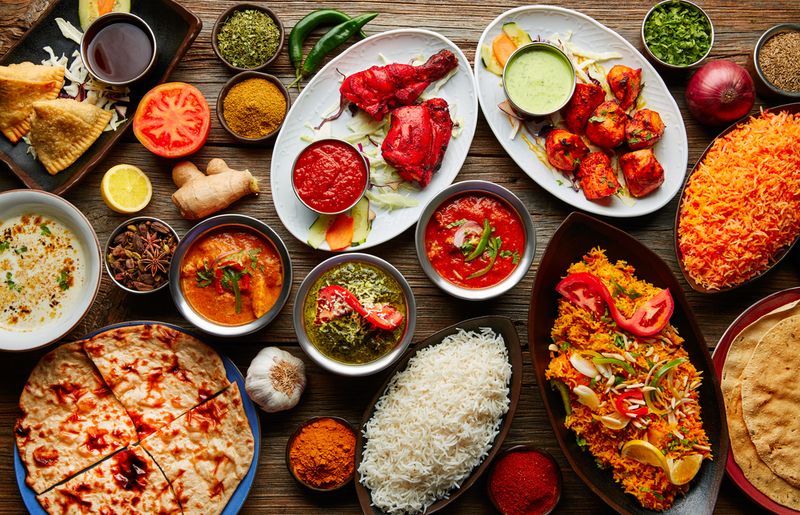
A love for spice can add zest to any meal, but it can also set your stomach ablaze. Spicy foods, while tantalizing the taste buds, may trigger indigestion or heartburn. The capsaicin in chili peppers can irritate the stomach lining, leading to discomfort.
Finding the right balance between flavor and spice could be the answer for sensitive stomachs. Enjoying your favorite spicy dish without the fiery aftermath requires a mindful approach. Sometimes, a little heat goes a long way.
6. Raw Onions And Garlic
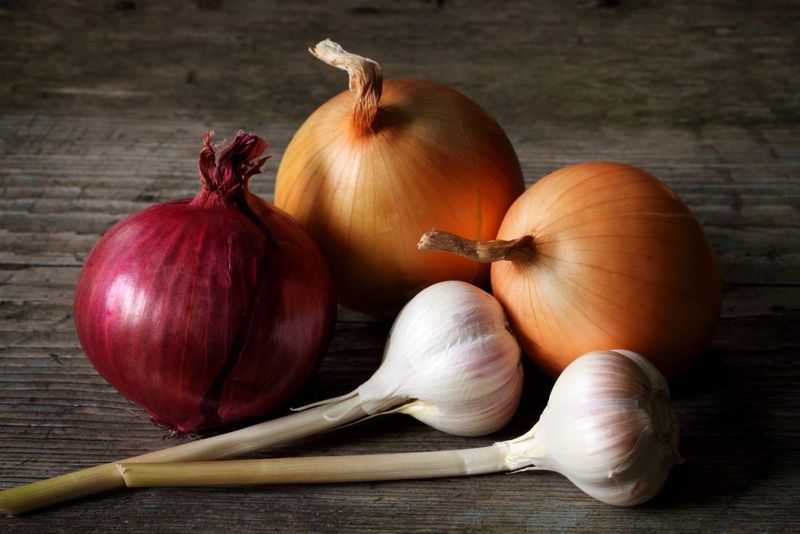
Raw onions and garlic are celebrated for their bold flavors, yet they can be harsh on sensitive stomachs. These pungent ingredients may lead to bloating, gas, or even a burning sensation. Cooking them often reduces their intensity, making them gentler on the digestive system.
For those who love their flavor without the stomach upset, roasted or sautéed versions can be a delicious compromise. Balancing taste with comfort is key to enjoying these culinary staples.
7. Citrus Fruits

Citrus fruits offer a burst of freshness and vitamin C, yet their acidity can trouble some stomachs. For those sensitive to acidic foods, citrus can lead to heartburn or an upset stomach. Enjoying these fruits in moderation or opting for less acidic varieties might help alleviate discomfort.
Balancing acidity with other flavors can enhance your culinary experience. Citrus may brighten a dish, but it’s essential to consider how it interacts with your digestive system.
8. Dairy Products

With their creamy allure, dairy products can be a double-edged sword for those with lactose intolerance. The inability to digest lactose can lead to bloating, gas, and discomfort. For many, exploring lactose-free alternatives like almond or soy milk offers relief without sacrificing taste.
Understanding your body’s reactions allows for more comfortable indulgence in dairy delights. Navigating the world of dairy requires careful attention to one’s digestive needs.
9. Cruciferous Vegetables
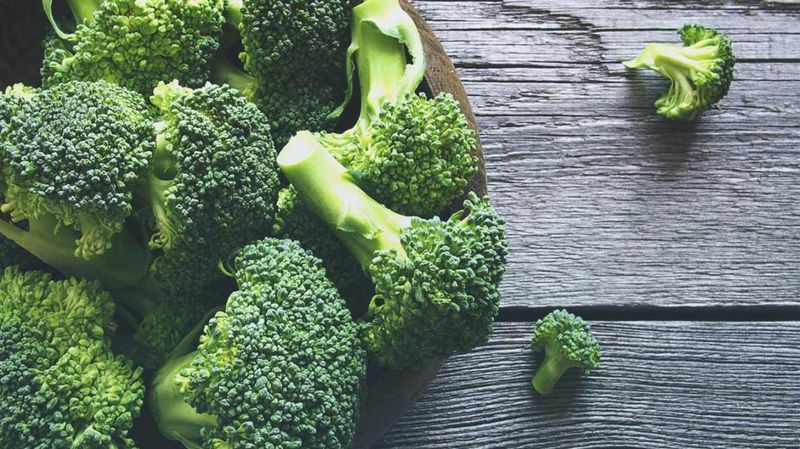
Veggies like broccoli and cauliflower are nutritional powerhouses but may also lead to digestive distress. Rich in fiber, these cruciferous vegetables can cause gas and bloating for some individuals. Incorporating them gradually into your diet or cooking them thoroughly might ease digestion.
They’re worth the effort for their health benefits, but mindful preparation can mitigate discomfort. The balance between nutrition and comfort makes these veggies both a challenge and a delight.
10. Sugary Desserts

Desserts filled with sugar offer a sweet escape but can be harsh on the stomach. High sugar content can lead to bloating and an unbalanced digestive system. Enjoying these treats in moderation or choosing healthier alternatives can provide relief.
Sugar substitutes or natural sweeteners may offer a satisfying yet gentler option for dessert lovers. It’s about finding the right balance to enjoy sweetness without stomach woes. Satisfying your sweet tooth doesn’t have to mean digestive distress.
11. High-Fat Foods

Rich, high-fat foods might delight the palate but can slow down digestion. This sluggishness often results in bloating or indigestion, making these foods less enjoyable for sensitive stomachs. Opting for lower-fat versions of your favorite dishes or employing cooking methods that reduce fat can alleviate discomfort.
Relishing the flavors without the stomach upset is possible with mindful choices. Every indulgent bite should be paired with awareness of its impact on your system.
12. Legumes
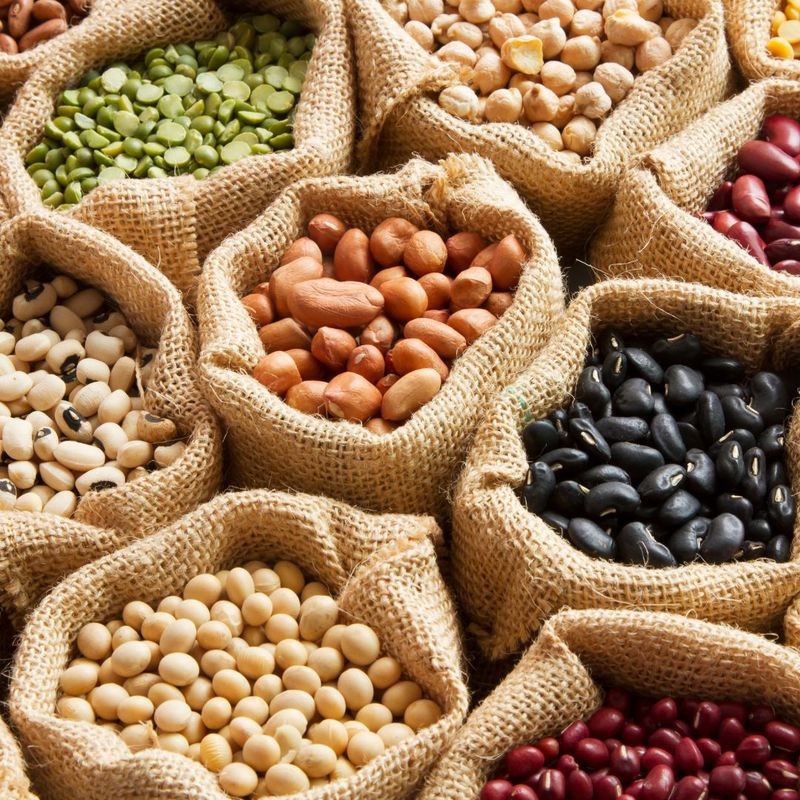
Known for their protein and fiber content, legumes can also be notorious for causing gas and bloating. These nutritional gems often require careful preparation to minimize digestive issues. Soaking or cooking them thoroughly can help reduce their gaseous effects.
Embracing legumes with patience can lead to their enjoyment without discomfort. The effort is worth the nutritional rewards they provide. Understanding how to prepare them can transform legumes from a source of distress to a delightful part of your diet.
13. Whole Grains
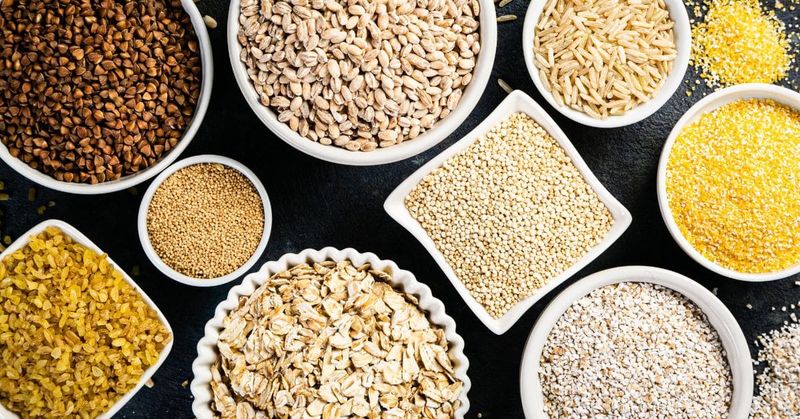
Whole grains contribute valuable nutrients and fiber but may also challenge the digestive system. For some, their fibrous nature can lead to bloating or discomfort. Gradually introducing them into your meals or exploring refined options can ease the transition.
They offer substantial health benefits, making any initial digestive hurdles worth overcoming. The key lies in balancing intake with your body’s needs to enjoy these grains comfortably. A mindful approach ensures whole grains are a nourishing addition to your diet.
14. Processed Meats

Processed meats, beloved for their flavor and convenience, often contain preservatives that can irritate the stomach. These meats might lead to bloating or indigestion, challenging those with sensitive systems. Exploring fresh, unprocessed alternatives could enhance comfort without sacrificing taste.
Understanding the impact of preservatives and additives helps in making informed dietary choices. While their savory allure is undeniable, being conscious of how they affect digestion is key to enjoying them responsibly.
15. Tomato-Based Products

Tomato-based products, with their rich flavor, can be a common source of heartburn for some individuals. The acidity in products like sauces and ketchup may irritate the stomach lining, leading to discomfort. Balancing their use with non-acidic foods can help keep symptoms at bay.
Exploring alternatives or reducing portion sizes might offer a solution for those sensitive to acidity. Enjoying the vibrant taste of tomatoes requires attention to how they interact with your digestive system.
16. Chocolate

Chocolate’s rich and comforting allure may come with a downside for some stomachs. Its caffeine content and high fat levels can lead to discomfort or heartburn. For those sensitive to its effects, moderation or opting for lower-fat options can offer relief.
The pleasure of savoring chocolate doesn’t have to be tempered by digestive woes. Finding the right balance allows enjoyment without regret. Its indulgence is best enjoyed when mindful of its potential impact on digestion.
17. Nuts And Seeds
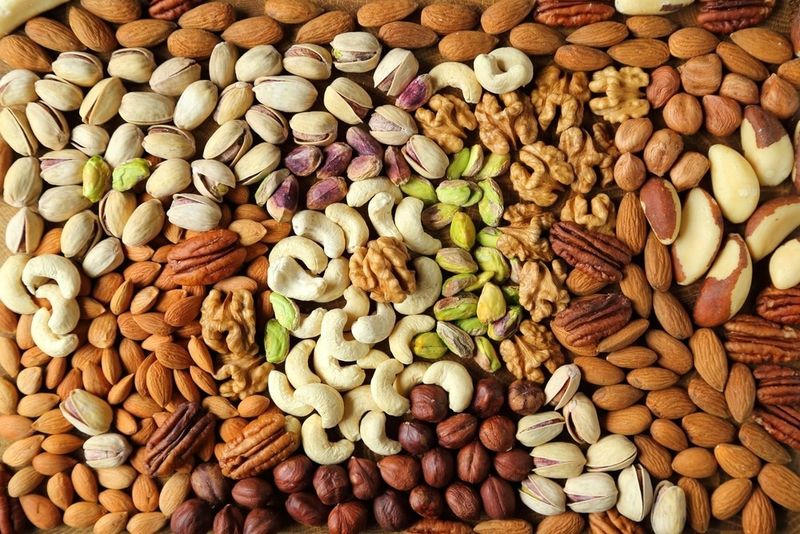
Nuts and seeds are prized for their nutritional benefits but can be tough on the stomach in large quantities. Their high fiber and fat content might lead to bloating or discomfort. Moderation and attention to portion sizes can help mitigate their potential effects.
Enjoying these nutrient-rich snacks doesn’t have to involve digestive distress. They provide much-needed energy and nutrients when consumed thoughtfully. Balancing their intake ensures that nuts and seeds remain a healthy part of your diet.
18. Alcohol

Though often associated with relaxation and celebration, alcohol can disrupt your stomach’s peace. It may increase acid production, leading to heartburn or upset stomach. For those sensitive to its effects, moderation or choosing lighter options might provide relief.
Being mindful of alcohol’s impact on digestion ensures that it remains a part of your life without causing undue distress. Balancing enjoyment with awareness allows for pleasurable experiences without digestive consequences.
19. Ice Cream

Ice cream’s creamy delight can be a double-edged sword for those with lactose intolerance. Its rich texture may lead to bloating and discomfort if lactose isn’t well-tolerated. Exploring lactose-free or plant-based alternatives ensures that indulgence doesn’t lead to regret.
Understanding your digestive limits allows for enjoyment without the downside. The creamy pleasure of ice cream can be savored without compromising stomach comfort.
20. Pickled And Fermented Foods
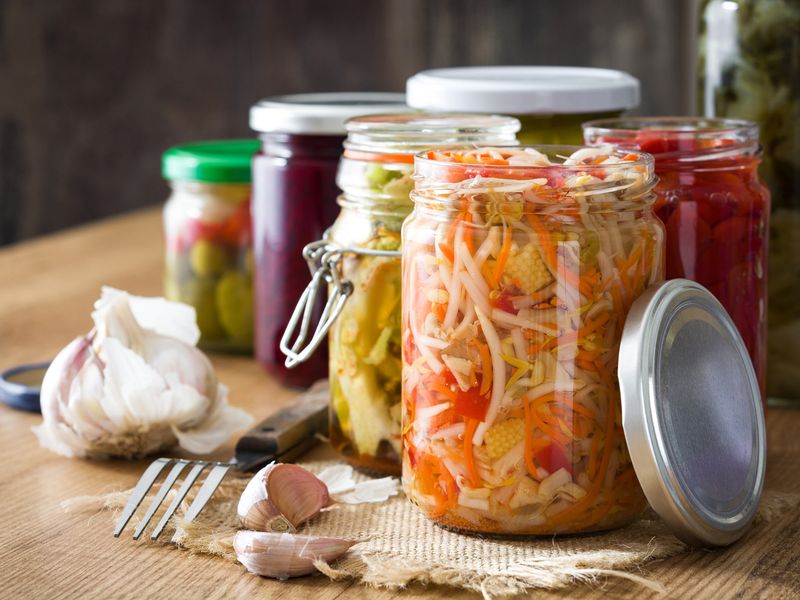
Pickled and fermented foods, known for their tangy flavors, can sometimes unsettle the stomach. For those sensitive to these foods, they may lead to bloating or discomfort. Enjoying them in moderation or balancing with other foods might offer a solution.
Understanding how they interact with your digestive system ensures a more enjoyable culinary experience. While their unique flavors are enticing, awareness of their effects is key to savoring them responsibly.
Leave a comment